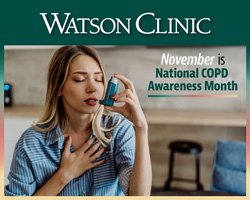 You've been coughing. A lot. And you get short of breath and fatigued doing things you used to easily do.
You've been coughing. A lot. And you get short of breath and fatigued doing things you used to easily do.
You may chalk these symptoms up to simply getting older. But they could be something more serious—like chronic obstructive pulmonary disease (COPD).
What is COPD?
COPD is an umbrella term that describes several progressive lung diseases, including emphysema and chronic bronchitis. The most common cause of COPD is smoking.
Many people don't recognize the symptoms of COPD until the disease is in its later stages, when it's not as easy to treat. These symptoms should raise red flags if you have them, especially if you have a history of smoking:
• Chronic cough.
• Shortness of breath while doing everyday activities.
• Frequent respiratory infections.
• Blue lips or fingernail beds.
• Fatigue.
• Producing a lot of mucus.
• Wheezing.
How is COPD diagnosed and treated?
There are several tests your doctor may use to diagnose COPD. The main test is called spirometry, and it measures how well you can blow air out of your lungs. Your doctor might order chest x-rays and other tests too.
If you smoke, the first step in treating COPD is to stop the habit. Ask your doctor about stop-smoking aids. Several are available.
You will also need to take medications. Common ones used to treat COPD include:
• Bronchodilators, which widen the airways narrowed by inflammation.
• Anti-inflammatory drugs, such as steroids, to reduce swelling in the airways.
Your doctor also may prescribe supplemental oxygen therapy if the amount of oxygen in your blood goes too low.
You may want to talk to your doctor about enrolling in a pulmonary rehabilitation program. These programs offer supervised exercise and education for people with breathing problems.
Symptoms of COPD sometimes improve when a person quits smoking and begins regular medication. However, the lungs are still damaged and can't be repaired.
COPD will never go away completely, but you can learn to control symptoms and lead a fulfilling life.
Watson Clinic’s Pulmonology department specializes in the treatment of COPD and other pulmonary disorders. Call 863-680-7190 for more information and to schedule an appointment.
Sources: American Lung Association; American Thoracic Society